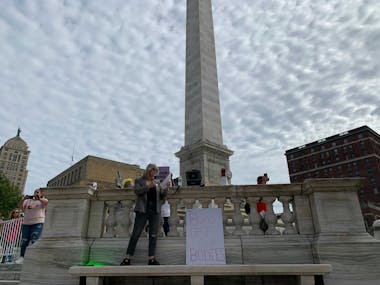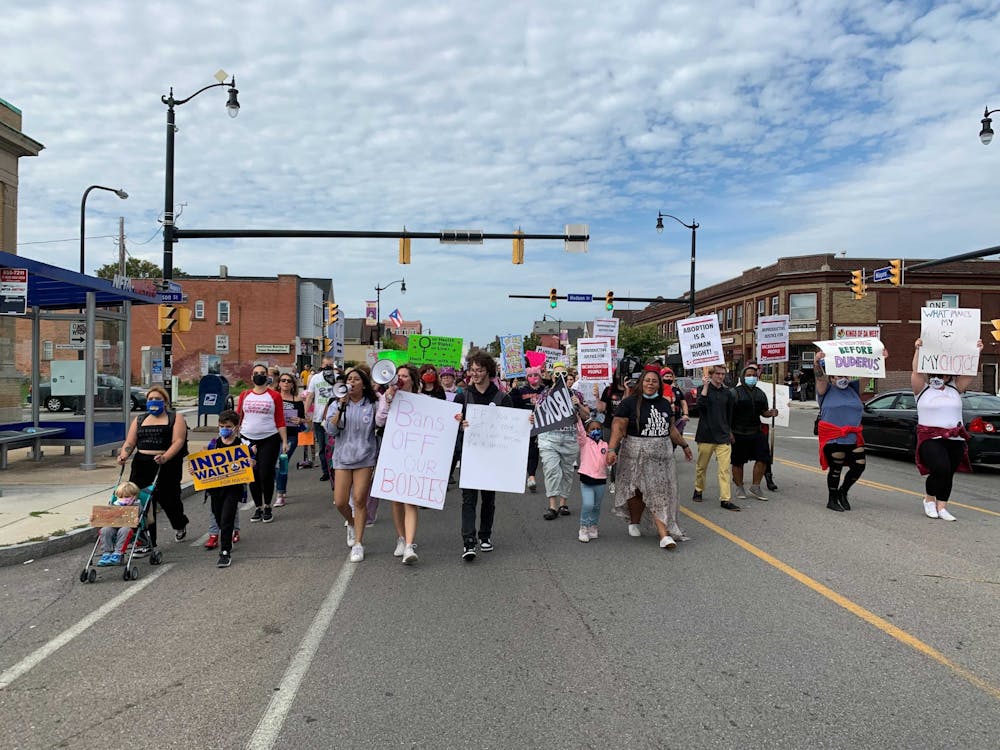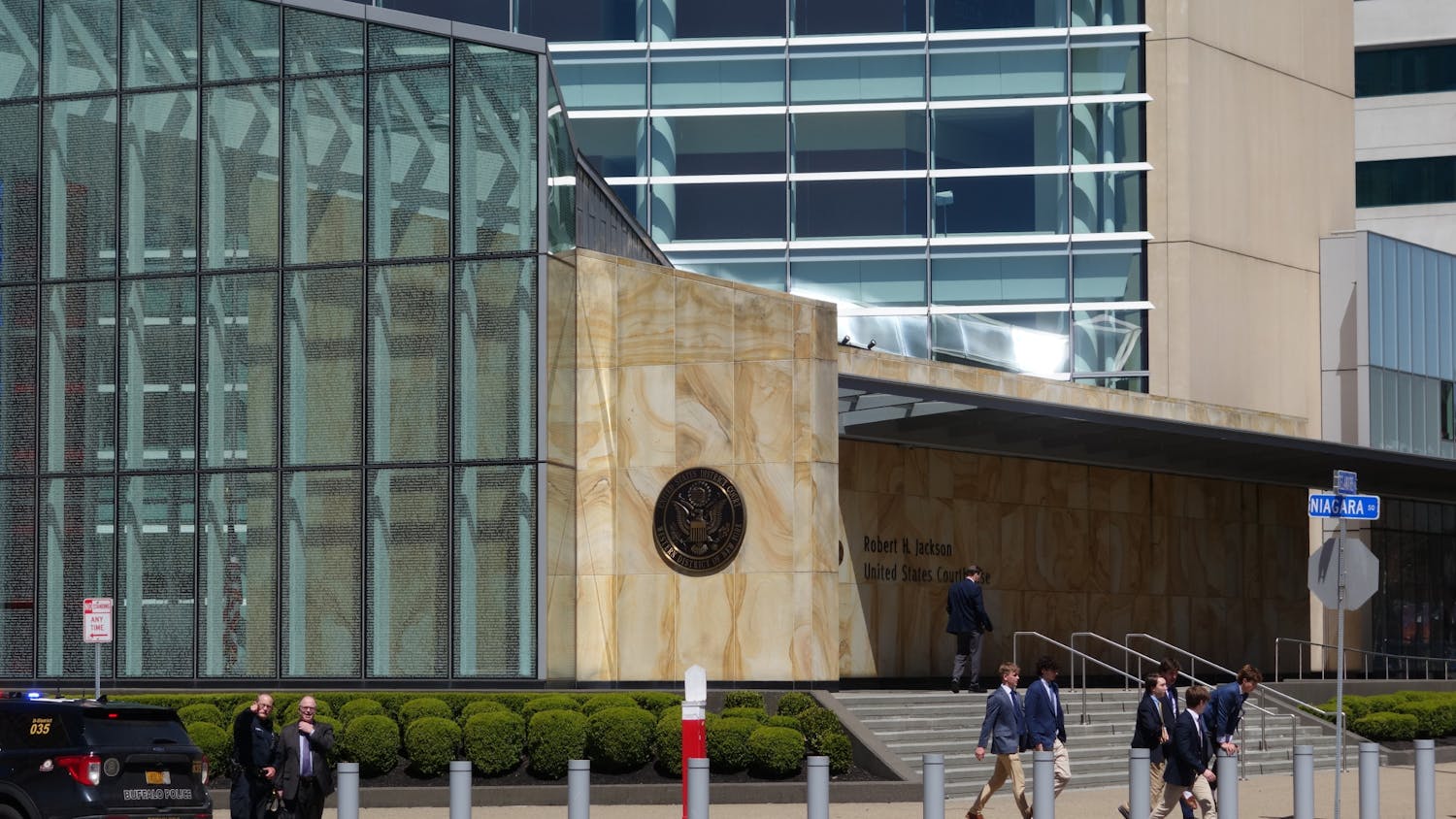Before Saturday, the biggest event Saumya Gilra had ever planned was a bake sale for her high school’s Key Club.
One restrictive Texas abortion law later, the junior political science major found herself co-organizing one of the hundreds of Women’s Marches happening across the country last weekend.
The event drew hundreds of protestors — most carried homemade signs, some pushed strollers, a few spoke at City Hall and at least two wore red robes reminiscent of those from “The Handmaid’s Tale.” Democratic nominee for mayor of Buffalo India Walton addressed protestors at Prospect Park before leading the march down Niagara Street to Buffalo City Hall. The demonstration garnered media attention from Buffalo TV stations WIVB-4 and WKBW-7.
Gilra never expected to lead something so big when she signed up to be a “circle host” for the Buffalo chapter of the Women’s March Network.
“My circle [chapter] was five members,” Gilra said. “That’s it. And I was very happy with that. I was like, ‘This is a small group. This is good.’ ...And then it became six, but it just stayed that way for a year.”

Gilra’s responsibilities as a circle host included updating her circle on local policy developments, getting involved in local campaign efforts and hosting occasional meetings, all work that Gilra described as “very casual.”
But halfway through the spring 2021 semester, Gilra had to return to her home country of India due to “immigration issues.” Gilra, occupied with 3 a.m. Zoom classes and the U.S. immigration system, disengaged from American news and her role with WMN.
When she returned to the U.S. shortly before the beginning of the fall semester, she discovered that 70 people had joined her circle. That number would soon climb to over 120.
“I was like, ‘What’s happening?’” Gilra said. “‘Why are so many people signed up? ...What’s going on?’ And then I saw the news.”
Texas Gov. Greg Abbott had signed a restrictive abortion bill into law that May. The law, which went into effect on Sept. 1, bans all abortions after six weeks of pregnancy (before many women know they’re pregnant) and allows all private citizens to sue abortion providers or anyone who helps a woman obtain an abortion.
“The country is moving backwards, it feels like,” Gilra said. “We had abortion [in Texas], and now we’re going backwards.”
Stewing in frustration over the new Texas law, Gilra received an email at the start of the fall semester from WMN asking if she would host a march in Buffalo.
“I thought it would be like a small thing, so I agreed to it,” Gilra said. “People started signing up online. I started putting stuff out on social media. And then Planned Parenthood sent me an email saying that they wanted to collaborate. I was rereading the email. I was like, ‘This is actually them?’ And it was.”
With Planned Parenthood’s connections, Gilra recruited Walton, a representative from the Erie County Commission on the Status of Women and a Planned Parenthood representative as speakers.
“It just exploded when they signed up to collaborate with us,” Gilra said. “And then a few local groups [like the Workers World Party of Buffalo] also wanted to [collaborate] because they were also going to do their own march, and then they realized that Buffalo already had one. So, we all just kind of joined together.”
As Gilra’s role grew, so did her contact with the general public. Community members Gilra had never met sent her emails detailing their experiences of sexual assault.
“It’s a lot,” Gilra said. “I don’t give them ‘go to the police or talk to someone’ advice because I’m sure they’ve gotten that from many, many people. ...[I’m] not saying that it’s a bad thing to report [sexual assault]. I just think that there’s so many people telling you to report it that sometimes you just need someone to listen, right? All I say is that... I understand, and we have meetings. We can always talk, stuff like that.”
Not all the contact was positive, though. Gilra received several hate messages over Facebook and email, especially in the days preceding the march.
“I would get these emails, and I didn’t know which ones were good and which ones were bad,” she said. “It was a lot.”
That, plus the burgeoning responsibilities of fundraising, coordinating speakers and working with several organizations, led Gilra to recruit her friend and sophomore business administration major Chelsea Derrick to help. Derrick helped contact media outlets, organize the march’s security and shop for poster supplies.
Nevertheless, the pressure of organizing something so large still terrified Gilra.
“I was freaking out,” Gilra said. “I thought I had nothing together. I cried [the] night [before], I cried [the] morning [of]. I called my brother [again]. He told me to shut up [to give me some much-needed tough love]. He was done with me [freaking out over and over]. ...I usually cry when I’m anxious because I don't know what else to do.”
Gilra and Derrick worked right up until the start of the march, making signs, answering protestors’ questions and greeting their guest speakers, including Walton, whom Gilra was exhilarated to meet.
“She shook my hand,” Gilra said. “I have a picture with India Walton! Very, very cool. I still can’t believe I have that, I still can’t believe she spoke at something that I was a part of. ...That’s something I’m always going to remember.”

Gilra and the other organizers led the march to City Hall, taking turns leading chants with a megaphone. Speakers, ranging from a mom with twins to a Planned Parenthood representative, addressed the crowd from the McKinley Monument outside City Hall. They covered topics as varied as the difference between the right to abortion and access to abortion, why crisis pregnancy centers aren’t healthcare and their personal experiences with abortion. Eventually, organizers invited protesters to give impromptu speeches — several took up the offer.
“I was very, very happy with that because that shows me that the environment was comfortable enough [that people] want[ed] to do it on the spot,” Gilra said.
Gilra herself was scheduled to speak, but she decided against it.
“I couldn’t do it,” she said. “Maybe another time.”
Regardless, the march went better than Gilra had expected.
“Strangely, I think it all went OK, and that’s the most surprising part,” she said. “I did not think it would be like that. ...I was so happy.”
Since the passage of Texas’ restrictive abortion law, reproductive and women’s rights have been hotly debated topics at UB and college campuses across the country. As a result, several UB students felt compelled to come to the protest, even though the law doesn’t directly affect them.
“[Since] Texas passed that bill, a lot of people are having anxiety now about health care and whether they have access to things like abortion,” Eesh Jaggi, a freshman political science major who attended the march, said. “And I think just having these protests [as] shows of solidarity really gets people in a more comfortable state.”
For other students, the demonstration was an assertion of reproductive rights, as well as a chance to connect with the people of Buffalo.
“We are here as a community to show how important women’s rights [are], and also to show the importance of just being together, being a community and supporting each other,” Maya Richardson, a senior political science and English major who attended the march, said.
Gilra still doesn’t know what issues she’s going to tackle next, but she has a few ideas.
“I don’t like UB’s counseling policy,” Gilra said. “You can [only] go to counseling every other week for 40 minutes. ...I know because I’ve been there, ...and that’s one thing that I really don’t like.”
Grant Ashley is a senior news/features editor and can be reached at grant.ashley@ubspectrum.com

Grant Ashley is the editor in chief of The Spectrum. He's also reported for NPR, WBFO, WIVB and The Buffalo News. He enjoys taking long bike rides, baking with his parents’ ingredients and recreating Bob Ross paintings in crayon. He can be found on the platform formerly known as Twitter at @Grantrashley.





